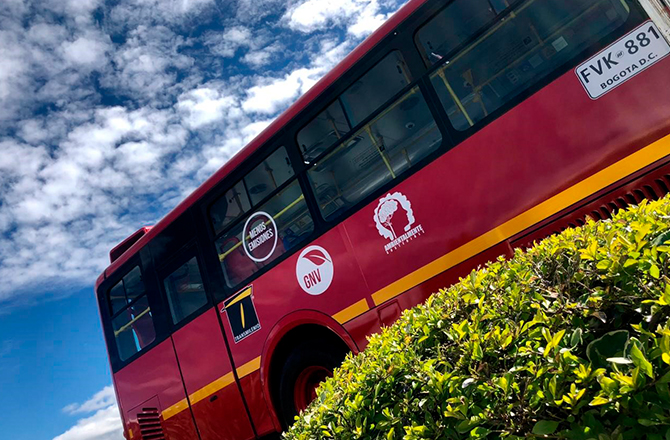

Climate change has urged us to become aware and to implement the necessary actions in some of our business activities to reduce our carbon footprint and provide strategies focused on conserving the environment.
Global efforts to move towards a low-carbon economy to slow climate change have increased projections for the use of natural gas, as it is the cleanest of hydrocarbons, essential in the transition from conventional fuels to renewable energies.
In our Sustainability Policy, we have incorporated good practices and the promotion of actions aimed at protecting the environment, preventing pollution, mitigating climate change derived from operations and adapting to the effects thereof. This is where our strategies aimed at raising awareness among employees, calculating the carbon footprint and its compensation, increasing energy efficiency and generating and implementing initiatives come from.
(103-3) Likewise, in 2020 we evaluated the performance of climate change management with the fulfillment of the goals corresponding to the activities planned in the Climate Change Management and Energy Efficiency Program of our company.
Furthermore, in line with corporate planning, which includes reducing the company's carbon footprint to meet the strategic objective of "consolidating sustainable development and best Corporate Governance practices," we measure the results with the indicator for the reduction of Carbon footprint through a monthly report of the activities carried out, the results obtained and the percentage of compliance with the Planning and Performance Management.
(Own) In updating our Public and Private Entities Disaster Risk Management Plan (PGDRDEPP), we included the analysis of critical scenarios, and we took into account threats or exposures due to the weather.
In total, we generated 61 files of probable scenarios in which the climate and external agents are considered as threats. Based on the categorization of risk levels, we schedule the necessary maintenance within time and budget.
We voluntarily offset 15,818 tons of co2eq, corresponding to 10% of tgi's carbon footprint in 2019.
(305-1) (305-2) (305-3) We reduced our carbon footprint by 25.6% compared to 2019 thanks to the reduction of GHG emissions in scopes 1 and 3. The latter was particularly benefited by the effects of the pandemic: reduction of corporate flights, consumption of paper and the destination of waste to landfills.
| Direct and indirect emissions (Ton CO2eq) | 2018 | 2019 | 2020 |
|---|---|---|---|
| Emissions scope 1 | 139.925,4 | 157.440,0 | 116.969,91 |
| Emissions scope 2 | 317,1 | 512,3 | 591,96 |
| Emissions scope 3 | 210,4 | 226,0 | 54,13 |
| Emissions scope 1, 2 and 3 | 140.452,9 | 158.178,3 | 117.616,0 |
The increase in scope 2 emissions is related to the entry into operation of the ECG Sabana, leading to an increase in electricity consumption.
The details of scope 1 operational emissions (305-1), the main indirect emissions of scope 3 (305-3) and the intensity of emissions (305-4) can be found in the ANNEXES. (See Annexes)
194 collaborators from the Sustainable Development Management and the Operational Vice Presidency participated in the "Environmental education on climate change management and calculation of personal and organizational carbon footprint" course developed with the aim of internalizing the concepts and raising awareness on the contribution that each one, as an individual, has on the planet's carbon footprint, as well as personal actions to reduce it.uno como individuo tiene en la huella de carbono del planeta, así como las acciones personales para disminuirla.
(305-5) We made progress in the plan for verifying leaks and tightening or closing those leaks in gas compression stations (15 compression stations: six critical stations, three semi-critical and six non-critical) and in 190 City Gates (44 critical, 28 semi-critical and 118 non-critical) on TGI's infrastructure.
We elaborated the SAP tool for the annual planning of the tightening from 2021.
We highlight the innovation exercise carried out with TGI staff to propose ideas aimed at reducing the gas released by the flare in the compression stations.
(305-5) We implemented the Repair Plan for the components identified in the inventory of fugitive emissions from the infrastructure, executed by the Maintenance Department at the Padua gas compression station; we obtained a reduction of 462 tons of CO2eq.
We include in our matrix of strategic risks and processes some of those related to climatic aspects and external physical agents, such as geological and hydrological risks, identified in the disaster risk management projects (PGDR), and which rest in the files of ANLA. We recognize the importance of considering these risks in light of the potential impacts on infrastructure, the community and the operations, and given the financial and reputational implications associated with non-continuity of service.
In line with the paris agreement, tgi has the long-term challenge of reaching “net zero”, once it supports the reduction of ghg emissions and offsets the totality of the carbon footprint generated.
(103-2) Implement the Carbon Footprint Reduction Plan in the short (2021), medium (2022-2024) and long term (2025-2027) of 3%, 5-7% and 10%, respectively.
Begin to measure fugitive emissions throughout TGI's infrastructure and permanently consolidate the Maintenance Plan therefor.
Consolidate strategies to reduce the consumption of natural gas in compressors.
(103-2) 1,500,000 trees planted is the challenge we have between 2021 and 2023, equivalent to offsetting 156,250 tons of CO2 equivalent.
(103-2) Intervene the mandatory 10% compensation in strategic compensation areas.